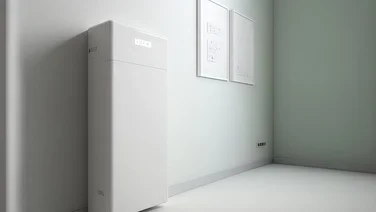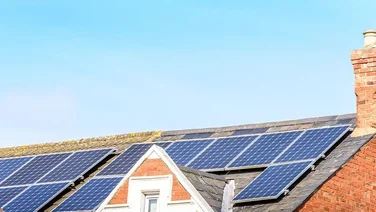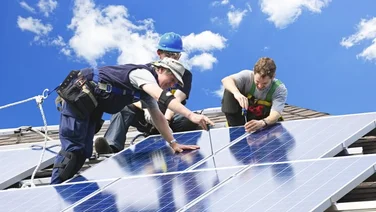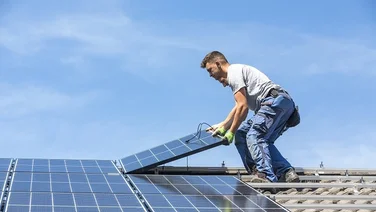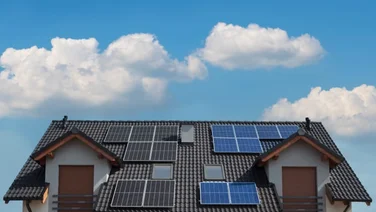We receive a small fee from trusted installers when you request a quote through our site. This helps us keep our content independent, well-researched and up to date – Learn more
- 1. AIKO N-Type ABC White Hole Series (72 Cells)
- 2. AIKO N-Type ABC Black Hole Series (72 Cells)
- 3. AIKO N-Type ABC Black Hole Series (54 Cells)
- 4. SunPower Maxeon 6 AC
- 5. Canadian Solar HiHero
- 6. SunPower Maxeon 3
- 7. Jinko Solar Tiger Neo N-type 72HL4-(V)
- 8. LONGi Hi-MO 7
- 9. JA Solar JAM72D40
- 10. Yingli Solar YLM GG 120 Cell
- 11. Yingli Solar Panda Bifacial 144 Cell
- How did we choose the most efficient solar panels?
- Summary
- Most efficient solar panels: FAQs
✔ Our research team has searched extensively for the most efficient panels
✔ All of these products have an efficiency rating of 22.5% or above
✔ The most efficient solar panel is the AIKO 72-cell N-Type ABC White Hole
As solar panel costs have fallen in recent years, solar panel efficiency has increased at a tremendous pace.
You can now choose from countless panels with more than 22% efficiency, meaning you can generate more electricity from the same amount of sunlight, which reduces your energy bills and carbon footprint.
Through exhaustive research, we’ve identified the most efficient solar panels for you.
You can also find the best solar panels for your home by using our custom-built comparison tool. Simply fill in this free form, and our trusted specialists will be in touch with quotes.
Where do you want to install solar panels?
Get startedThe most efficient solar panels at a glance
Find the most efficient solar panels for your property by comparing solar panels from various suppliers.
1. AIKO N-Type ABC White Hole Series (72 Cells) – 24%
2. AIKO N-Type ABC Black Hole Series (72 Cells) – 23.8%
3. AIKO N-Type ABC Black Hole Series (54 Cells) – 23.6%
4. SunPower Maxeon 6 AC – 22.8%
5. Canadian Solar HiHero – 22.8%
6. SunPower Maxeon 3 – 22.7%
7. Jinko Tiger Neo N-type 72HL4-(V) – 22.65%
8. Yingli Solar YLM GG 120 Cell – 22.5%
9. Yingli Solar Panda Bifacial 144 Cell – 22.5%
10. Longi Hi-MO 7 (LR5-72HGD-580M) – 22.5%
11. JA Solar JAM72D40 – 22.5%
1. AIKO N-Type ABC White Hole Series (72 Cells)
Efficiency | Power (W) | Product warranty | Performance warranty | Heat resistance | Weight (kg) | Eco-friendly credentials |
|---|---|---|---|---|---|---|
24% | 620 | 15 years | 88.85% after 30 years | -0.29% per °C | 28.2 | Promotes carbon neutrality with Burgenland Energie |
AIKO has changed the game. The Chinese company’s new N-Type ABC series of solar panels have pushed the efficiency and power limits for domestic solar arrays to new heights – especially this 72-cell panel.
Its efficiency rating is a record-breaking 24%, and while its technological durability isn’t quite at SunPower’s level, functioning at 88.85% of its initial level after 30 years is still excellent.
Considering it starts off with a peak power output of 620 W, this means it’ll still be generating a high of 550 W in the 2050s, which is glorious.
All it needs is a better name and an improved product warranty, as 15 years is poor by current standards.
2. AIKO N-Type ABC Black Hole Series (72 Cells)
Efficiency | Power (W) | Product warranty | Performance warranty | Heat resistance | Weight (kg) | Eco-friendly credentials |
|---|---|---|---|---|---|---|
23.8% | 615 | 15 years | 88.85% after 30 years | -0.29% per °C | 28.2 | Promotes carbon neutrality with Burgenland Energie |
AIKO’s second-best solar panel is very similar to its best panel, except it’s completely black, and will therefore make your roof look sleeker.
It’s also slightly less efficient, though 23.8% is still at least one percentage point better than any other company can offer at the moment.
And its peak power output is five watts lower than its superior counterpart, though again, 615 W is a huge amount of solar electricity.
If you can get either of these panels on your roof for a reasonable price, they’ll massively cut your electricity bills – though the relatively short product warranty remains an issue.
3. AIKO N-Type ABC Black Hole Series (54 Cells)
Efficiency | Power (W) | Product warranty | Performance warranty | Heat resistance | Weight (kg) | Eco-friendly credentials |
|---|---|---|---|---|---|---|
23.6% | 460 | 15 years | 88.85% after 30 years | -0.29% per °C | 20.5 | Promotes carbon neutrality with Burgenland Energie |
AIKO’s takeover of our efficiency rankings ends with this all-black, 54-cell panel.
It’s a tiny bit less efficient than its siblings, but it’s also 27% lighter and 24% smaller.
So for every four 72-cell panels you put on your roof, you can put five 54-cell models – and still achieve a top-tier level of efficiency.
The only downside to this plan is its 460 W peak output, but that’s still 110 W more than you’ll get from the average solar panel.
4. SunPower Maxeon 6 AC
Efficiency | Power (W) | Product warranty | Performance warranty | Heat resistance | Weight (kg) | Eco-friendly credentials |
|---|---|---|---|---|---|---|
22.8% | 440 | 40 years | 92% after 25 years | -0.29% per °C | 21.8 | Panels are recycled |
SunPower has earned two of the top spots in our rankings, and with good reason: its products are fantastic, as shown by their starring roles on our best solar panels page.
At 22.8%, the Maxeon 6 AC is incredibly efficient, and it’ll keep providing you with high levels of solar power for decades to come.
SunPower’s 40-year product warranty is a revolutionary step in a field where 25 years has long been the absolute maximum, and comes after the company analysed data from more than 33 million of its panels.
And the Maxeon 6 AC’s 25-year performance warranty – which guarantees it’ll still be generating electricity at 92% of its starting rate – is unbeatable among top-tier panels.
5. Canadian Solar HiHero
Efficiency | Power (W) | Product warranty | Performance warranty | Heat resistance | Weight (kg) | Eco-friendly credentials |
|---|---|---|---|---|---|---|
22.8% | 445 | 25 years | 88.85% after 30 years | -0.26% per °C | 23.0 | Aiming for 100% renewable power before 2030 |
This new entry to our list is a rising star.
As well as reaching the same efficiency rating as the Maxeon 6 AC, the HiHero is also well-equipped to withstand heavy snow and fierce winds – as you may expect from a Canadian company – and is one of the most heat-resistant panels on this list.
You can also place your trust in Canadian Solar, as this panel comes with a 25-year product warranty, rather than the paltry 15-year guarantees customers previously received.
And the Ontario-based company, which has offices on six continents, is taking steps to power all its operations with renewable energy before 2030, which is a worthy goal.
Where do you want to install solar panels?
Get started6. SunPower Maxeon 3
Efficiency | Power (W) | Product warranty | Performance warranty | Heat resistance | Weight (kg) | Eco-friendly credentials |
|---|---|---|---|---|---|---|
22.7% | 430 | 40 years | 88.25% after 40 years | -0.27% per °C | 21.2 | Panels are recycled |
The Maxeon 3 is slightly less efficient than its younger sibling, which is why it has to settle for a lower position – but this excellent panel comes with its own unique advantages.
It’s a little lighter than the Maxeon 6 AC, and more heat resistant, which means you can expect to hold on to more efficiency as the temperature rises past 25°C.
Its top power rating is lower, but still high, while the guarantee that it’ll still be working at 88.25% after 40 years is stunning.
There’s not much between these two SunPower panels, so don’t worry too much about which to choose. If you can get your hands on either of them – or the Canadian Solar panel that separates them in our list – do it.
Get free solar panel quotes
Answer a few quick questions, and our trusted installers will send you bespoke solar panel quotes – for free.
7. Jinko Solar Tiger Neo N-type 72HL4-(V)
Efficiency | Power (W) | Product warranty | Performance warranty | Heat resistance | Weight (kg) | Eco-friendly credentials |
|---|---|---|---|---|---|---|
22.65% | 585 | 12 years | 87.4% after 30 years | -0.29% per °C | 28.0 | N/A |
Jinko has produced a monster of a panel here.
The latest Tiger Neo weighs an enormous 28 kg and comes with a maximum power output of 585 W – 67% more than the average panel – and its improved 22.65% efficiency rating is top-notch.
Unfortunately, the company – which has factories in China, Malaysia, Vietnam, and the US – still only offers a horribly low 12-year product warranty.
However, as long as nothing breaks in the physical panel, its performance warranty is decent, at 87.4% after 30 years.
8. LONGi Hi-MO 7
Efficiency | Power (W) | Product warranty | Performance warranty | Heat resistance | Weight (kg) | Eco-friendly credentials |
|---|---|---|---|---|---|---|
22.5% | 580 | 12 years | 88.18% after 30 years | -0.28% per °C | 31.8 | N/A |
LONGi has broken into our rankings with its latest Hi-MO release, which boasts a 22.5% efficiency rate.
This gigantic 31.8 kg bifacial panel can absorb sunlight on both its sides – so make sure it isn’t flush with your roof – and comes with a huge peak power output of 580 W.
Its heat resistance puts it in the upper echelon of panels, though unfortunately LONGi only provides a 12-year product warranty.
However, the panel is guaranteed to be at 88.18% of its initial performance after 30 years, which is decent.
If you’re looking for more assurances about the nature of the company though, we can’t offer any. LONGi – just like Jinko, JA, and Yingli – has no eco-friendly credentials beyond manufacturing and selling solar panels.
9. JA Solar JAM72D40
Efficiency | Power (W) | Product warranty | Performance warranty | Heat resistance | Weight (kg) | Eco-friendly credentials |
|---|---|---|---|---|---|---|
22.5% | 580 | 12 years | 87.4% after 30 years | -0.30% per °C | 31.8 | N/A |
JA Solar’s JAM72D40 is extremely similar to LONGi’s Hi-MO 7, which is good news, as they’re both excellent panels.
The JAM72D40 also has an efficiency rating of 22.5%, a peak power output of 580 W, a product warranty of just 12 years, and is extremely large, at 2.58 m².
However, it has a slightly worse heat resistance, losing -0.3% with each degree the mercury rises above 25°C, and comes with an inferior performance warranty of 87.4% after 30 years.
10. Yingli Solar YLM GG 120 Cell
Efficiency | Power (W) | Product warranty | Performance warranty | Heat resistance | Weight (kg) | Eco-friendly credentials |
|---|---|---|---|---|---|---|
22.5% | 380 | 12 years | 85% after 25 years | -0.35% per °C | 23.2 | N/A |
Yingli Solar’s panels have their drawbacks, but with an extremely high efficiency rating of 22.5%, they’ve grabbed two spots on our list.
The 120-cell YLM GG panel comes with a decent performance warranty of 85% after 25 years – even though it is the lowest on our list – but its product warranty lets it down.
Yingli has let itself down by only offering coverage for 12 years. Most solar panels last at least 25 years, and the majority of manufacturers reflect this fact in their product warranties.
This panel is gloriously efficient, but its product warranty is a good reason to look elsewhere, if you can.
Want to get a better idea of what it’s like to own a set of solar panels? Check out our case study with Shirley Ward – a 73-year-old retired office worker, based in North Yorkshire.
Shirley has a 2.4 kW solar array and a Solax battery, and managed to break even on the system in 10 years. Despite electricity prices increasing around the world, Shirley’s panels have brought her energy bills down to £15 a month, instead of £50.
Check out the full interview with Shirley to learn more about solar panels.
11. Yingli Solar Panda Bifacial 144 Cell
Efficiency | Power (W) | Product warranty | Performance warranty | Heat resistance | Weight (kg) | Eco-friendly credentials |
|---|---|---|---|---|---|---|
22.5% | 415 | 12 years | 83.5% after 30 years | -0.35% per °C | 26.0 | N/A |
This 144-cell model is also 22.5% efficient, which is fantastic – but again, Yingli’s insistence on a 12-year product warranty is a significant downside.
Both the YLM GG and this model also come with sub-par heat resistance, meaning you’ll lose more efficiency at the height of summer than you would with most top panels.
The Panda panel also lives up to its name, weighing in at a hefty 26kg – so if you’re thinking of getting this model, make sure your roof can support it.

How did we choose the most efficient solar panels?
Our team of four researchers spent 34 hours finding and analysing the 48 best solar panels available right now to discover the most efficient ones on the market.
We looked through every solar panel’s data sheet, noted down the efficiency ratings, and compared them against panels from each of the 17 companies we checked to create a top tier of efficient panels.
Why is solar panel efficiency important?
The more efficient a panel is, the more electricity it’ll generate.
This means you can save more money on your energy bills while taking up the same amount of roof space – giving you a better return on your investment.
The market average is currently 21%; the panels on our list start above 22% and get much higher.
Summary
You now know everything about the most efficient solar panels on the market right now.
And if you’re ready to go solar, you’re not alone – 60% of UK residents want to switch to renewable energy, according to our latest National Home Energy Survey.
The next step is finding the right deal – and that’s where we come in. Just fill in this free form, and our trusted solar panel installers will get in touch with their best prices.
Most efficient solar panels: FAQs
Which solar panels are most efficient?
The most efficient solar panels on the market at the moment are AIKO’s 72-cell panel from its N-Type ABC White Hole Series, the 72-cell panel from its Black Hole Series, and the 54-cell panel from that same Black Hole Series.
But it’s just a matter of time before this rapidly developing technology hits new heights.
NASA is currently developing solar cells that with an efficiency rate of up to 40% – and with increasing moves to use more of the solar light spectrum, we’ll see even better rates soon.
Check out our guide on Reasons Solar Panels Lose Efficiency Over Time to find out how to get the most out of your panels.
Is there a 30% efficient solar panel?
There are now 30% efficient solar cells, after this mark was passed multiple times in recent times.
In July 2022, researchers at the Swiss Centre for Electronics and Microtechnology (CSEM) and École Polytechnique Fédérale de Lausanne (EPFL) hit 31.25% with a tandem silicon-perovskite solar cell, breaking the 30% barrier for the first time.
And in December 2022, scientists at the Helmholtz-Zentrum Berlin used the same combination of materials to reach a stunning 32.5%.
There are no 30% efficient solar panels on the market at the moment – but it’s just a matter of time.
Why are solar panels only 20% efficient?
Typical solar panels are only 20% efficient because they’re made with silicon, which can only absorb part of the solar spectrum.
Combining silicon with other substances, like perovskite, will allow solar panels to absorb more sunlight, from other parts of the spectrum.
With standard silicon panels, there’s also some inevitable efficiency loss from photons that bounce off panels, and others that have their energy converted to heat, instead of electric current.


